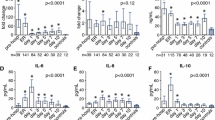Abstract
Objective: To investigate the ex vivo endotoxin-inducible heat shock protein 70 (HSP70) expression in the peripheral blood mononuclear cells (PBMC) of patients with severe sepsis in order to assess the capacity of this potentially protective response during systemic inflammation. Design: Prospective observational study in consecutive patients with severe sepsis and healthy blood donors. Setting: Surgical intensive care unit in a university hospital. Patients and participants: Eleven patients with the diagnosis of severe sepsis, one patient who had recovered from severe sepsis and 13 healthy blood donors. Interventions: None. Measurements and results: We studied the inducibility of HSP70 expression in the PBMC of patients with severe sepsis and healthy blood donors ex vivo. Human whole blood was incubated with variable lipopolysaccharide (LPS from Salmonella minnesota Re 595) concentrations (0; 0.1; 10; 100 ng/ml) for different periods of time (0.5; 2; 4; 10 h). The PBMC were separated by Ficoll density gradient and then disrupted by hypotonic lysis. HSP70 was measured by means of enzyme-linked immunosorbent assay (ELISA). We found a LPS dose- and time-dependent inhibition of ex vivo HSP70 expression in the PBMC of both patients with severe sepsis and healthy individuals. However, the levels of HSP70 expression in patients were significantly lower compared to those of healthy individuals at all LPS concentrations and incubation times. On average, HSP70 expression in the PBMC of healthy controls was 2.8 (range 1.2–3.9) times higher than in patients. HSP70 expression was inducible by thermal heat shock in the PBMC of both patients and healthy individuals. Conclusions: Endotoxin inhibits HSP70 expression in PBMC ex vivo. In vivo, the suppression of HSP70 expression induced by endotoxin and high levels of proinflammatory cytokines may contribute to the cellular dysfunction of immunocompetent cells concerning antigen presentation, phagocytosis and antibody production associated with decreased resistance to infectious insults during severe sepsis.
Similar content being viewed by others
Author information
Authors and Affiliations
Additional information
Received: 9 July 1998 Final revision received: 12 October 1998 Accepted: 29 October 1998
Rights and permissions
About this article
Cite this article
Schroeder, S., Bischoff, J., Lehmann, L. et al. Endotoxin inhibits heat shock protein 70 (HSP70) expression in peripheral blood mononuclear cells of patients with severe sepsis. Intensive Care Med 25, 52–57 (1999). https://doi.org/10.1007/s001340050786
Issue Date:
DOI: https://doi.org/10.1007/s001340050786




